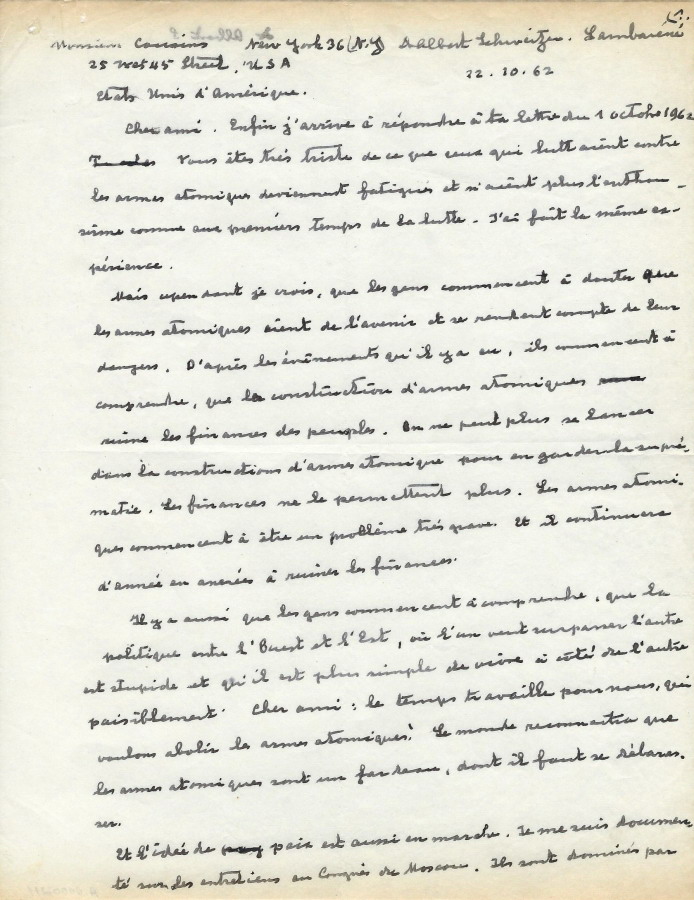Description



Schweitzer, Albert (1875 – 1965)
‘This is a very momentous date in the history of our era… We must fight.’
An extraordinary and important three-page autograph letter signed by Albert Schweitzer, 22nd October 1962. Schweitzer writes in French, at the beginning of the Cuban Missile Crisis, to peace activist and author Norman Cousins.
Written on three separate pages in bold fountain pen ink, Schweitzer sets out his feelings about atomic weapons and world peace. He opens, ‘You are very sad to see that those who fought against atomic weapons are becoming weary and no longer have the enthusiasm they had at the beginning of the struggle. I have known the same thing.’
He goes on, ‘However, I believe that people are beginning to have doubts about the future of atomic weapons and realize their dangers. After the events which have happened, they are beginning to understand that the construction of atomic weapons ruins the wealth of the people. We can no longer embark on the building of atomic weapons in order to maintain superiority. The finances will not allow it.’
Schweitzer then moves onto more political matters: ‘People are also beginning to understand that East/West politics , where one wishes to surpass the other, is stupid and it is simpler to live side by side peacefully. Dear friend: time is on our side, we who wish to abolish atomic arms. The world will understand that atomic weapons are a burden which we must shed.’
‘And the idea of peace is also moving forward. I have kept myself informed on the discussions at the Moscow Congress. They are dominated by the conviction that peaceful coexistence in the world is possible. We live at a time when the problems of Cuba and of Berlin are the only ones discussed between East and West. In the end, these are small problems.’Schweitzer closes, ‘And so, let us continue our struggle against atomic weapons. Let us not be discouraged by the exhaustion of our old companions in the struggle’. He then adds a long post-script, which begins, ‘The USA is determined to use atomic arms for the Cuban and the Berlin question. This is a new and serious development! I would not have believed that the government would dare to take this grave decision. And I feel that we must not accept this decision without protest. In order to have a debate, I think it would be useful for me to write an open letter to McNamara to whom the USA government has said that in a conflict involving Cuba or Berlin, he could use all weapons, which means atomic arms. This attack would be better than an article in a newspaper.’
Schweitzer attaches a copy of this letter (no longer present), noting that in the letter he points out to McNamara ‘the gravity of this decision and the terrible responsibiltiy with which he has been entrusted, vis a vis humanity’. He then writes, ‘I feel that we cannot accept that the USA could wish to use atomic weapons in a future war involving Cuba or Berlin. We must resist. This is a very momentous date in the history of our era… We must fight. We will not allow atomic war to enter, or attempt to enter, so easily into today’s world. Let us fight.’
In very fine condition. Tensions had been growing, publicly, since the previous month, when President Kennedy had said in a speech that ‘the gravest issues will arise’ should the Soviets be deploying any missiles in Cuba. However, it was on the exact date of this letter — October 22nd 1962 — that Kennedy announced to the world the real discovery of missiles in Cuba by US intelligence, and the Cuban Missile Crisis began in earnest.
Whilst writing this letter, Schweitzer cannot have realized quite how momentous a date in history that October 22nd 1962 would become. With the world teetering on the brink of nuclear war, the words in Schweitzer’s letter into even sharper focus and given even greater poignancy. An astonishing item.

